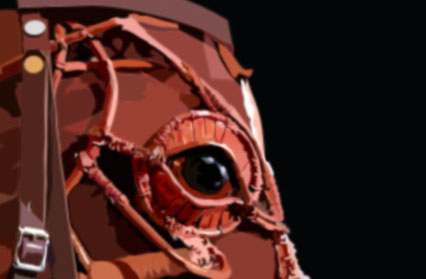Wales Millennium Centre, Cardiff
Art is all about decision-making. Every step, every brushstroke, every sentence, is the result of a process that closes one door and presents to an audience the implications behind another. Most art fails when the number of wrong decisions overshadow the ones correctly made. A masterpiece is something that gets it overwhelmingly right. The stage production of War Horse, now seven years old, is not faultless, but it is a masterpiece.
Rarely, if ever, has the stage seen such a pitch-perfect piece of popular theatre without it having songs sequinned into the story. War Horse is transcendent in that non-theatre goers as far as the eye can see have flocked to see it. Try, just try, and get a ticket for this visit to Cardiff; a month-long stay, near enough. How many tours set up stall for that long in our capital? It could no doubt stay for twice as long. Is it as good as its press? Well, it really is. There are moments when it is sentimental, moments when the vastness of the story threatens to jar with the confines of an orderly running time, but these blemishes are few and far between, and the successes are so bright and warm, and likely so permanent, that the production has a lot of room to play with.
So, the story, for those who have not encountered either Morpurgo’s book, Speilberg’s film or Nick Stafford’s much-lauded production, is simple enough: Devonian farm boy Albert follows his horse, Joey, who has been bought by the army as an officer’s steed, to the trenches of the Somme. The story splays open, much as did the lives of millions during that time. Joey is our guide through what is essentially a series of folk tales; the feuding brothers, the tragic prince, the hero’s journey, the homeward-bound warrior, but they are seamlessly integrated into a tableaux that is sometimes touching and sometimes heart-thumpingly distressing. Characters come and go; we see cameos of the people who made up the different shades of monochrome that was the shadows of the Great War. The human characters are full, even when fleeting, and the story here, on stage, moves at a galloping pace.
At its centre, of course, are the puppets. Calling them such seems a slight. When the curtain falls and the cast come to take their bows, the audience reserve a standing ovation for the two main horses (and their operators), Joey and Topthorn. They are entirely beguiling; breathing, characterful entities who immediately occupy the stage as organic performers. They have a gothic originality to them, a look which is at once both familiar and tantalisingly unsafe, something which folds into the Brechtian otherworldliness of each scene. We are always aware that we are watching a representation of reality, not an attempt at reality itself. This is a dream, a parable, a symphony, where acts and tragedies and emotions and the surging of the soul are represented by the microcosm of symbolism. We are in a warehouse of humanness, a place where war can only be represented in ghostly terms. Nothing quite seems real and yet it tells of very real things at every instance. This is theatre.
War Horse has been a phenomenal success as a children’s book, a crushing (if predictable) disappointment as a film, but is a full and rich theatrical experience. There are moments clearly lifted from, and delivered to, a cinematic sensibility, but they are deftly chosen and deployed. There are slow motion action scenes, tides of soundtrack that jolt and wave you toward emotional sign posts – but whereas in many plays this type of unwelcome intrusion sticks in the muzzle, here it seems very much a part of the whole. The reason is that War Horse is pure theatre, and cinema owes a great debt to the live art. It is Brechtian with laser-sharp astuteness, even when a tank rolls over the hill and confronts the mighty Topthorn, you can see the old German innovator nodding in approval. Everything here is make-believe, is play, and it is truer for it. It becomes obvious by the end that War Horse is a profound statement on how a civilised and creative culture deals with the horrors of its past. Art will help to explain the reality of the Great War better than any documentary, or biography or ceremony, in this year of remembrance. I would wager that War Horse, with puppets, illustrations torn into the sky, Elgarian music, mechanical birds, cap guns and choreographed violence, will touch more people, explain more unexplainable things, add weight to more hearts, than anything else our generation will be offered.
Art is all about decision making. And the greatest decision made here, was putting War Horse on the stage in the first place.
original illustration by Dean Lewis



 Enjoyed this article? Support our writers directly by buying them a coffee and clicking this link.
Enjoyed this article? Support our writers directly by buying them a coffee and clicking this link.







